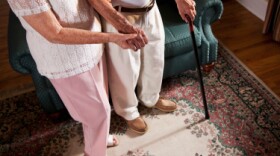-
A 2008 federal law is supposed to protect people from having their genes used against them. But it only applies to health insurance — not, for example, long-term-care insurance. That's exactly the type of insurance people might seek after learning they're genetically predisposed to some medical problem down the road.
-
Neuroscientists have found that bilingual seniors were better at certain skills that can fade with age than their monolingual peers, which could help protect them against Alzheimer's disease. But the researchers don't know whether learning a second language in adulthood would provide the same benefit.
-
An experimental drug developed to fight Alzheimer's disease partially reversed hearing loss caused by exposure to extremely loud sounds, researchers say. The results apply only to mice, but scientists are encouraged by the fact that the medicine caused new hair cells to grow in the animals' inner ears.
-
With most of the more than 5 million people with Alzheimer's cared for at home, the nation's largest provider of nonmedical senior home care now offers free training workshops for family caregivers. Caregivers are taught how to make use of long-term memories and to recognize what triggers anxiety.
-
The year saw some disappointments in the development of drugs to treat Alzheimer's. But the setbacks were offset by progress in other areas. The upshot from this year's mixed results, some scientists say, is that treatment for Alzheimer's needs to start long before forgetfulness and muddled thinking are apparent.
-
Alzheimer's is the disease that creeps in and slowly erases what you know until, eventually, there's no more to erase. How this happens is still a mystery, but this short animation by Po Chou Chi tries to make poetic sense of what goes on.
-
New research suggests that by the time an Alzheimer's patient is diagnosed, many key neurons are already dead. Neuroscientists say it's possible that several recent trials of drugs for Alzheimer's have failed because the drugs were given after symptoms had already started to appear.
-
It's the latest setback in a field marked by failure. Earlier this month, Pfizer and Johnson & Johnson said they were dropping development of a similar experimental drug after big clinical studies showed it wasn't working.
-
Would you get tested for your potential risk for Alzheimer's disease, even though the prediction is imperfect and there is no cure for the condition? Studies suggest people can handle the results just find.
-
The mutation is rare but it appears to protect some people from developing the disease. The finding is an encouraging sign for drug researchers looking for medicines that have a similar effect in the brain.

Play Live Radio
Next Up:
0:00
0:00
Available On Air Stations










